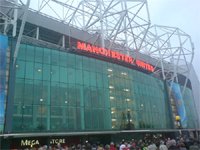Manchester United Bond Over-subscribed
-
Manchester United Parent Company Reveals £716m Debt
Debt growing for Glazers it appears.
 CL: Outside of Old Trafford, Manchester United vs, Milan
CL: Outside of Old Trafford, Manchester United vs, MilanManchester United's parent company has revealed that it is carrying debts of £716.5 million.
Red Football Join Venture Ltd, owned by the Glazer family, has filed accounts for the year ending June 30 2009 which show that overall debt has increased by £17m from £699m.
Payment in kind (PIK) loans show the biggest rise, going up £175m to £202m. Those typically have a higher interest rate than bank loans, which have dropped from £518m to £509m.The biggest rise has come in the payment in kind (PIK) loans, which typically have a higher interest rate, which show a £27million increase to £202million. Bank loans, meanwhile, have dropped by £9million to £509million.
The company paid out £68.5m in interest in 2009. They did manage to record a profit of £6.4m, but only thanks to the £80m sale of Cristiano Ronaldo to Real Madrid. The previous year had seen them lose £47m.
A spokesman for the Glazer family insisted that the debt has no bearing on how the club is run.
"The club has a £50million surplus to work with once the interest payments have been made," he explained, according to Press Association Sport.
-
terrible.
how can they manage such a big debt?
-
Successful £500m Manchester United bond issue gives Glazer family breathing space
The Glazer family will begin restructuring Manchester United’s debts next week after a bond issue successfully raised £500 million.
 Creative accounting: a £500m bond will ease the financial pressure on the Glazer brothers
Creative accounting: a £500m bond will ease the financial pressure on the Glazer brothersLONDON -(Dow Jones)- U.K. Premier League football club Manchester United's planned GBP500 million high-yield bond is already over-subscribed, part-way through investor roadshows, thanks to interest from non-traditional investors, people familiar with the matter said Wednesday.
The roadshows, used to drum-up investor interest, are currently being held in the U.S., having already passed through Singapore, Hong Kong, Edinburgh and London. They are due to finish Thursday.
"They [Manchester United] have been out to a broad investor base across Asia, Europe and the U.S. There is definite traction from those investors," one of the people said.
The people said that buyers from outside the traditional high-yield investor-base are showing interest in the bonds, with investors from Asia, hedge funds and high net-worth individuals identifying with Manchester United's strong brand and legacy.
"It is probably the premier sports brand in the world, so people think there is value in that," another person familiar with the matter said. "The company has done a very good job on the roadshow of talking about the commercial side of things. Their presentation is very much on the positive and on the club's growth."
However, traditional high-yield investors are showing only limited interest in the bonds because the club does not have a credit rating, which prevents many funds from investing. Furthermore, the covenants included in the bond documentation are considered too loose and the club is considered too highly leveraged to attract the traditional high-yield funds, the people said.
James Lee, a fixed-income analyst at Calvert Asset Management in the U.S., said that in general, sports club-related debt doesn't have a great history.
"For European investors, buying this bond is probably the equivalent of an American investor investing in the National Football League--we don't expect the teams ever to go away--but in the U.S. we don't have that same kind of passion for soccer that they do in Europe," he said.
Price guidance on the bond isn't due to be issued until Thursday. Interest will run to around £43 million, payable in two instalments. The bond is split into two tranches, with the £250 million Sterling portion paying investors 8.75 per cent.
Demand from US investors was stronger than anticipated however, and the US dollar issue of $425 million will offer a lower rate, 8.375 per cent, indicating the strength of interest. The United sales road-show was in the US this week, with chief-of-staff Edward Woodward leading presentations in San Francisco and New York.
The bond issue was twice oversubscribed, a level of interest that represents an endorsement of United’s financial position from the unsentimental investment community. Supporters remain deeply concerned at the use of club profits to service acquisition debt.
The successful bond issue will allow the Glazers to pay off the majority of the £509 million of bank debt secured against Manchester United, and begin reducing the £202 million “payment-in-kind” loans borrowed against the family’s holding in Old Trafford. They were due to begin repaying the existing bank debt in August 2013 and to have repaid it all by 2015. The bond gives them a further two years to repay, as well as offering them the chance to reduce the PIK debt.
Interest on the PIKs is due to increase two points to 16.25 per cent later this year.
-
eh...somehow i feel this bonds not really worth it leh.... i mean bonds for a soccer club?! unless man utd stop spending on transfers and just sell its star players, i really don't see how a club gonna start making revenue (unless man utd is arsenal)